10 new books by Peace Corps writers: May – June, 2020
To purchase any of these books from Amazon.com — CLICK on the book cover, the bold book title, or the publishing format you would like — and Peace Corps Worldwide, an Amazon Associate, will receive a small remittance from your purchase that will help support the site and the annual Peace Corps Writers awards.
We now include a one-sentence description — provided by the author — for the books listed here in hopes of encouraging readers 1) to order the book and 2) to volunteer to review it. See a book you’d like to review for Peace Corps Worldwide? Send a note to Marian at marian@haleybeil.com, and we’ll send you a copy along with a few instructions.
•
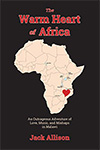 The Warm Heart of Africa: An Outrageous Adventure of Love, Music, and Mishaps in Malawi
The Warm Heart of Africa: An Outrageous Adventure of Love, Music, and Mishaps in Malawi
Jack Allison (1966 – 69)
Peace Corps Writers
June 2020
224 pages
$14.95 (paperback), $6.99 (Kindle)
When Jack Allison joined the Peace Corps in 1967, he never intended to write the number one hit song in Malawi or be described by Newsweek as more popular than Malawi’s own president.
•
 Land • Home • Mountain View
Land • Home • Mountain View
Short Stories
by Ursula Bendix (Colombia 1967 – 69)
Memoir Books
160 pages
February 2020
$28.72 (paperback), $9.99 (Kindle)
Buying and selling real estate is the vehicle by which the complexities of life are shown, and the realtor, Ingrid Fromm, whose hopes and longings unfold with story as she tries to find the perfect solution for her clients in a beautiful mountainous setting.
•
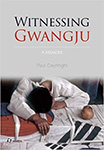 Witnessing Gwangju: A Memoir
Witnessing Gwangju: A Memoir
by Paul Courtright (South Korea 1979 – 81)
Hollym
May 2020
208 pages
$32.50 (paperback)
Also in Korean: 푸른눈의증인 (Blue-eyed witness)
As a PCV Paul Courtright was caught in the middle of what would become known by some as the Gwangju Massacre, also referred to as the May 18 Democratic Uprising where it is estimated that over 600 people were killed.
•
 House of the Ancients & Other Stories
House of the Ancients & Other Stories
by Clifford Garstang (Korea 1976 – 77)
Press 53 Publisher
May 2020
172 pages
$17.95 (paperback)
Nobody’s perfect, but some of us — mostly men — are blinded by our hubris and baser urges. Judgment is impeded. Mistakes are made. The stories in House of the Ancients and Other Stories, many of them set outside the U.S., explore some of the consequences of these common failings.
•
 The Last Rhino
The Last Rhino
Robert E. Gribbin (Kenya 1968 – 70)
iUniverse
April 2020
218 pages
$24.15 (paperback)
Deep in the vastness of a lost corner of the Congo a reformed big game hunter tackles the management of Garamba National Park, wending his way through modern African bureaucracies, civil strife and corruption in order to combat elephant poachers and remnants of the Lord’s Resistance Army, all the while in search of the possibility that northern white rhino may still exist. Accurately set amidst the woes of contemporary Congo, the story educates and enlightens about the challenges of conservation in the troubled heart of Africa.
•
 Poetry Sketches: A Peace Corps Memoir
Poetry Sketches: A Peace Corps Memoir
Eldon Katter (Ethiopia 1962 – 1964)
Peace Corps Writers
June 2020
266 pages
$10.48 (paperback)
Poetry Sketches: A Peace Corps Memoir is a collection of poems, letters, and art illustrating the experience of a Peace Corps Volunteer in Ethiopia in the early 1960s. The book also touches upon the years leading up to and following the author’s Peace Corps service.
•
Unscrewing America
by Mike McCabe (Mali 1989 – 91)
Little Creek Press
272 pages
February 2020
$17.95 (paperback), $8.00 (Kindle)
Unscrewing America explores how and why American politics has taken a turn toward madness, and describes how and why so many Americans have come to believe the nation’s best days are in the rear-view mirror. But the book doesn’t dwell on diagnosis. It emphasizes cure.
•
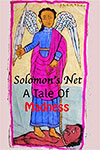 Solomon’s Net: A Tale Of Madness
Solomon’s Net: A Tale Of Madness
by Lew Mermelstein (Ethiopia 1970 – 73)
Does Not Apply
398 pages
January, 2020
$16.95 (paperback), $2.99 (Kindle)
Steve Williams, recently terminated Peace Corps Volunteer, is being treated for paranoid schizophrenia by his doctors in Iowa, but Steve knows that the real problem is evil Zar demons and only his Ethiopian lover Abebech can help. But they’d never let Steve back in to Ethiopia, not after what he did.
•
The Toughest Job I Ever Loved
A Peace Corps Memoir
by Jonathon Shacat (Gabon 1998 – 2000)
Independently Published
181 pages
October 2017
$9.71 (paperback); $4.99 (Kindle)
In his memoir, Jonathon Shacat narrates his experience as a fish culture extension agent in the Peace Corps in the rainforest of Central Africa, where he taught villagers how to build clay ponds and raise tilapia.
•
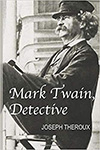 Mark Twain, Detective
Mark Twain, Detective
by Joseph Peter Theroux (Western Samoa 1975 – 78)
Self Published
212 pages
June 2020
$10.00 (paperback), $0.00 (Kindle)
Mark Twain is due to arrive to give a series of lectures, and history tells us the plague prevented him from landing. This story upends that myth. He must deal with a scurrilous attack on his reputation and a notorious “Miss X.”
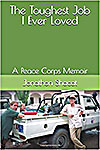
Continuing rush of books, new books — oncoming books — by returned Peace Corps Volunteers to me is past amazing to startling. How did this happen I ponder.
Altogether there must be several hundreds, reaching to a thousand (or more?) books from them.
Who might have guessed (imagined) this? Kennedy, Shriver, Eleanor Roosevelt, Harold Stassen in the beginning and others were seers if not prophets and seeders.
Even given the innate abilities of what seemed ordinary young Americans to begin with I feel much honor must be given to the shepherds who guided and developed opportunities for so many these publications.
I remember the first such book and it came from one of my own Ghana One group, “the first in the field”, the year following (maybe the next year) his return. He is still alive at age 88. I saw him just yesterday with 9 of us on a Ghana 1 Zoom meeting (4pmEST and for me 1pmWST here in San Francisco). He lives in Virginia, and is still writing vigorously and has his own news service plus being a retired professor of journalism in the Univ of Ghanzau (hope I spelled that correctly — we used to call it Canton) and has lived pretty much around the world as an international correspondent.
Further, Arnold is one of so many writers, story tellers, poets, editors, and publishers who have made their ways into print –some famously– from the beginning of the Peace Corps who have had books published and/ or articles published in magazines and newspapers for all these years since we on Ghana I left the USA at the end of August 1961 — 49 of us in that 2 engine Convair airplane (Arnold came along soon after) that stopped halfway from Washington D.C. in the mid-Atlantic to refuel, then made a stop in Dakar, Senegal, and then came to Accra, Ghana. We were mostly in our mid-twenties, fresh faced, smart for somethings, dumb as sticks for others, but able to learn and do sometimes what seems to have been too hard for these youngsters (as I view us now). Our country trusted us and we had John F. Kennedy and Sargent Shriver (memento mori).